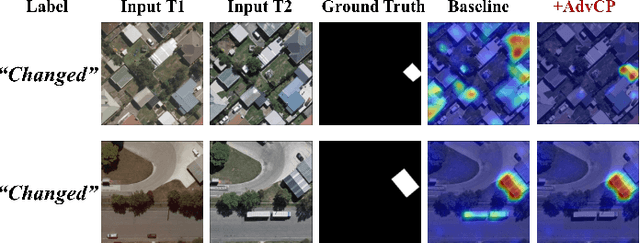Cuiqun Chen
UniABG: Unified Adversarial View Bridging and Graph Correspondence for Unsupervised Cross-View Geo-Localization
Nov 15, 2025Abstract:Cross-view geo-localization (CVGL) matches query images ($\textit{e.g.}$, drone) to geographically corresponding opposite-view imagery ($\textit{e.g.}$, satellite). While supervised methods achieve strong performance, their reliance on extensive pairwise annotations limits scalability. Unsupervised alternatives avoid annotation costs but suffer from noisy pseudo-labels due to intrinsic cross-view domain gaps. To address these limitations, we propose $\textit{UniABG}$, a novel dual-stage unsupervised cross-view geo-localization framework integrating adversarial view bridging with graph-based correspondence calibration. Our approach first employs View-Aware Adversarial Bridging (VAAB) to model view-invariant features and enhance pseudo-label robustness. Subsequently, Heterogeneous Graph Filtering Calibration (HGFC) refines cross-view associations by constructing dual inter-view structure graphs, achieving reliable view correspondence. Extensive experiments demonstrate state-of-the-art unsupervised performance, showing that UniABG improves Satellite $\rightarrow$ Drone AP by +10.63\% on University-1652 and +16.73\% on SUES-200, even surpassing supervised baselines. The source code is available at https://github.com/chenqi142/UniABG
Advancing Weakly-Supervised Change Detection in Satellite Images via Adversarial Class Prompting
Aug 24, 2025



Abstract:Weakly-Supervised Change Detection (WSCD) aims to distinguish specific object changes (e.g., objects appearing or disappearing) from background variations (e.g., environmental changes due to light, weather, or seasonal shifts) in paired satellite images, relying only on paired image (i.e., image-level) classification labels. This technique significantly reduces the need for dense annotations required in fully-supervised change detection. However, as image-level supervision only indicates whether objects have changed in a scene, WSCD methods often misclassify background variations as object changes, especially in complex remote-sensing scenarios. In this work, we propose an Adversarial Class Prompting (AdvCP) method to address this co-occurring noise problem, including two phases: a) Adversarial Prompt Mining: After each training iteration, we introduce adversarial prompting perturbations, using incorrect one-hot image-level labels to activate erroneous feature mappings. This process reveals co-occurring adversarial samples under weak supervision, namely background variation features that are likely to be misclassified as object changes. b) Adversarial Sample Rectification: We integrate these adversarially prompt-activated pixel samples into training by constructing an online global prototype. This prototype is built from an exponentially weighted moving average of the current batch and all historical training data. Our AdvCP can be seamlessly integrated into current WSCD methods without adding additional inference cost. Experiments on ConvNet, Transformer, and Segment Anything Model (SAM)-based baselines demonstrate significant performance enhancements. Furthermore, we demonstrate the generalizability of AdvCP to other multi-class weakly-supervised dense prediction scenarios. Code is available at https://github.com/zhenghuizhao/AdvCP
Plug-and-Play DISep: Separating Dense Instances for Scene-to-Pixel Weakly-Supervised Change Detection in High-Resolution Remote Sensing Images
Jan 10, 2025Abstract:Existing Weakly-Supervised Change Detection (WSCD) methods often encounter the problem of "instance lumping" under scene-level supervision, particularly in scenarios with a dense distribution of changed instances (i.e., changed objects). In these scenarios, unchanged pixels between changed instances are also mistakenly identified as changed, causing multiple changes to be mistakenly viewed as one. In practical applications, this issue prevents the accurate quantification of the number of changes. To address this issue, we propose a Dense Instance Separation (DISep) method as a plug-and-play solution, refining pixel features from a unified instance perspective under scene-level supervision. Specifically, our DISep comprises a three-step iterative training process: 1) Instance Localization: We locate instance candidate regions for changed pixels using high-pass class activation maps. 2) Instance Retrieval: We identify and group these changed pixels into different instance IDs through connectivity searching. Then, based on the assigned instance IDs, we extract corresponding pixel-level features on a per-instance basis. 3) Instance Separation: We introduce a separation loss to enforce intra-instance pixel consistency in the embedding space, thereby ensuring separable instance feature representations. The proposed DISep adds only minimal training cost and no inference cost. It can be seamlessly integrated to enhance existing WSCD methods. We achieve state-of-the-art performance by enhancing {three Transformer-based and four ConvNet-based methods} on the LEVIR-CD, WHU-CD, DSIFN-CD, SYSU-CD, and CDD datasets. Additionally, our DISep can be used to improve fully-supervised change detection methods. Code is available at https://github.com/zhenghuizhao/Plug-and-Play-DISep-for-Change-Detection.
 Add to Chrome
Add to Chrome Add to Firefox
Add to Firefox Add to Edge
Add to Edge